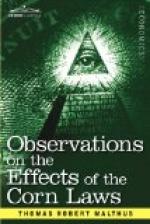The evils which must always belong to restrictions upon the importation of foreign corn, are the following:
1. A certain waste of the national resources, by the employment of a greater quantity of capital than is necessary for procuring the quantity of corn required.
2. A relative disadvantage in all foreign commercial transactions, occasioned by the high comparative prices of corn and labour, and the low value of silver, as far as they affect exportable commodities.
3. Some check to population, occasioned by a check to that abundance of corn, and demand for manufacturing labours, which would be the result of a perfect freedom of importation.
4. The necessity of constant revision and interference, which belongs to almost every artificial system.
It is true, that during the last twenty years we have witnessed a very great increase of population and of our exported commodities, under a high price of corn and labour; but this must have happened in spite of these high prices, not in consequence of them; and is to be attributed chiefly to the unusual success of our inventions for saving labour and the unusual monopoly of the commerce of Europe which has been thrown into our hands by the war. When these inventions spread and Europe recovers in some degree her industry and capital, we may not find it so easy to support the competition. The more strongly the natural state of the country directs it to the purchase of foreign corn, the higher must be the protecting duty or the price of importation, in order to secure an independent supply; and the greater consequently will be the relative disadvantage which we shall suffer in our commerce with other countries. This drawback may, it is certain, ultimately be so great as to counterbalance the effects of our extraordinary skill, capital and machinery.
The whole, therefore, is evidently a question of contending advantages and disadvantages; and, as interests of the highest importance are concerned, the most mature deliberation is required in its decision.
In whichever way it is settled, some sacrifices must be submitted to. Those who contend for the unrestrained admission of foreign corn, must not imagine that the cheapness it will occasion will be an unmixed good; and that it will give an additional stimulus to the commerce and population of the country, while it leaves the present state of agriculture and its future increase undisturbed. They must be prepared to see a sudden stop put to the progress of our cultivation, and even some diminution of its actual state; and they must be ready to encounter the as yet untried risk, of making a considerable proportion of our population dependent upon foreign supplies of grain, and of exposing them to those vicissitudes and changes in the channels of commerce to which manufacturing states are of necessity subject.




